Maintaining form and fitness as a cyclist demands a high level of commitment — which all too easily tips over into obsessiveness and a loss of perspective. Jim Cotton goes in search of bike-life harmony

Let’s face it, we think about our bikes a lot. When we should be working, when we’re watching TV, even sometimes in our sleep, our minds drift to cycling. Of course, ours is a largely healthy and wholesome pastime, but can it become too all-consuming? If we get too bogged down in numbers and statistics, is our commitment to cycling liable to become self-destructive? As someone who has fallen foul of this hazard, I wanted to assess the delicate balance between riding your bike for the simple joy of it, and its becoming an instrument of obligation and obsession.
We all know that cycling releases endorphins that boost mood, and many of us rely on the blissful unwinding effect of riding our bikes. “A problem is only truly a problem if it remains after a bike ride,” the old saying goes.
Sports psychologist and avid rider Josephine Perry explains this further: “Cycling gives you fantastic headspace to relieve stress and cope with diffcult things in life.” Even the NHS website says that cycling “can improve the symptoms of some mental health conditions such as depression and anxiety.”
As with anything that feels really good, you want keep doing it as frequently as practically possible. The feel-good brain chemicals, the delicious data, the measurable fitness gains... it’s all very addictive.
“Tangible numbers to improve on — power, time, speed — are noticeably absent in a lot of the major activities in daily life,” says Perry. Many day jobs are devoid of measurable indicators of success — promotions and pay rises are vanishingly infrequent. “The evidence of progress as you train is hugely addictive, and it makes you want to ride and train more,” adds Perry.
Diese Geschichte stammt aus der August 29, 2019-Ausgabe von CYCLING WEEKLY.
Starten Sie Ihre 7-tägige kostenlose Testversion von Magzter GOLD, um auf Tausende kuratierte Premium-Storys sowie über 8.000 Zeitschriften und Zeitungen zuzugreifen.
Bereits Abonnent ? Anmelden
Diese Geschichte stammt aus der August 29, 2019-Ausgabe von CYCLING WEEKLY.
Starten Sie Ihre 7-tägige kostenlose Testversion von Magzter GOLD, um auf Tausende kuratierte Premium-Storys sowie über 8.000 Zeitschriften und Zeitungen zuzugreifen.
Bereits Abonnent? Anmelden
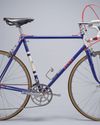
CLASSIC BIKE - JOHNNY BERRY
Johnny be good at making beautiful lightweight bikes

UK SCENE - WUNDERKIND HUDSON WINS YORKSHIRE CX
Newly crowned junior hill-climb champ shows his versatility by winning round seven on the mud
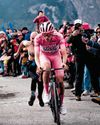
WATT WORKS FOR ME TADEJ POGAČAR
The man himself - subject of this special issue - explains the key performance changes behind his record-breaking year

11 WAYS TO POG-UP YOUR PLAN
Tadej Pocačar's performance is out of reach but you can adapt his training to raise your game. Chris Marshall-Bell consults the experts to find out how

Why do modern aero bikes look less aero?
Are today's aero bikes really faster, or is marketing just getting better? Joe Baker investigates...
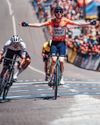
REVIEW OF THE YEAR
An Olympic year is always special and the cycling season once again delivered a year of highs and lows, from Pogi's triple to Katie Archibald's pre-Olympic trip

MEET THE PARENTS
What made Tadej Pogačar the phenomenon he is today? Chris Marshall-Bell went to Slovenia to meet his mum and dad, Mirko and Marjeta
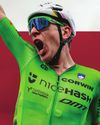
HALF MAN HALF GOAT
Tadej Pogačar may have had a phenomenal season, but has he done enough to cement his status as the greatest of all time? Chris Marshall-Bell weighs the arguments for and against

Lefevere cashes in his chips and leaves cycling management
The news that Patrick Lefevere will step down as Quick Step boss marks the end of an era, after 22 years in charge
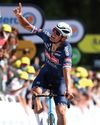
Mathieu van der Poel weighs up skipping Tour de France
Dutchman hints at missing Tour in favour of mtb Worlds bid, reports Tom Thewlis from Dénia, Spain